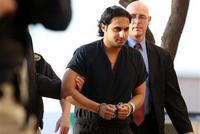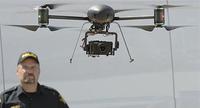-
Lawsuit against DHS contractor grows to $17 million
The lawsuit against private security firm Eagle Technologies Inc. has recently ballooned to more than $17 million; the firm was sued in March 2010 by a dozen current and former employees who provided armed security at the yet to be opened DHS National Biodefense Analysis and Countermeasures Center at Fort Detrick in Frederick, Maryland; the employees accused Eagle Technologies, which was recently purchased by Protection Strategies Inc., of withholding overtime pay, failing to reimburse employees for work-related expenses, and other labor violations; an investigation by the Department of Labor found that the firm had committed sixty-one labor violations
-
-
Brooklyn mosque moves forward, clears legal hurdle

A mosque in Brooklyn, New York is moving ahead with construction plans after a New York state judge dismissed a lawsuit filed by an anti-mosque organization; its construction was blocked after local residents began actively protesting stating that the religious facility would negatively affect the neighborhood; Judge Mark Partnow ruled in favor of the mosque’s proponents after Lamis Deek, the attorney representing the mosque’s builder, suggested that opposition was based on racism, going so far as to call protestors terrorists; Albery Butzel, the attorney representing Bay People, said that the organization is not anti-Muslim and insisted that the group’s opposition was based on a lack of parking
-
-
247 on U.S. terror watch list bought guns, explosives in 2010

There are eleven reasons why an individual may not be able to buy firearms or explosives in the United States — for example, being a convicted felon or an illegal immigrant; those on the U.S. terror watch list, however, are free to buy firearms and explosives; according to the FBI, in 2010 247 of them did — a similar number to that of 2009; some lawmakers want the attorney general to be able to prevent an individual on the watch list to buy a gun, but the counterargument is that the list is not always accurate, and that the attorney general is a political appointee; moreover, the list is secret, and letting people know they are on it may complicate the ability of law enforcement to track them and their associates
-
-
California school building regulators had ties with anti-regulation lobby group
A California watchdog group recently revealed that state officials in charge of enforcing earthquake standards for school buildings have had a long and questionable relationship with a lobbying group that actively works to oppose building safety regulations in public schools; senior officials with the Division of the State Architect had been dues paying members of the Coalition for Adequate School Housing, which actively lobbies for less regulation on school construction; in 1997, state regulators were told that taxpayers would reimburse their membership dues to be a part of the lobbying group; officials maintain that there has been no corruption; in 2010 a major regulatory provision in place since 1933 was removed
-
-
House panel extends chemical plant safety act
In 2006, Congress first authorized DHS to regulate security at high-risk chemical facilities. In response, DHS developed the Chemical Facility Anti-Terrorism Standards (CFATS); to date, DHS has reviewed information submitted by more than 39,000 chemical facilities and determined that 4,744 are high-risk and, therefore, covered under CFATS; yesterday, a House panel voted for a 7-year extension of CFATS
-
-
Federal court upholds ruling against Arizona immigration law

A federal appeals court ruled against the controversial Arizona immigration law stating that it was a violation of the constitution; the Ninth U.S. Circuit Court of Appeals upheld a stay blocking the implementation of significant portions of the Arizona immigration law stating that immigration enforcement was a federal responsibility and the Arizona law overstepped its bounds; last month five additional immigration bills failed to pass through the Arizona legislature including the highly controversial attempt to deny children of illegal immigrants birthright citizenship; experts believe that the bills failed largely as a result of the business community’s opposition
-
-
TSA fired an agent for being a witch
TSA fires a security screener at New York’s Albany International Airport for being a witch; the screener, who practices Wicca, was accused by a fellow worker of casting a spell on her (the fellow worker’s) car’s heater so it would not work; when the screener refused to participate in mediation to dispel myths about Wicca, she was terminated
-
-
Federal judge denies judgment for nightmare arrest
A Long Island resident, who took a photograph alongside a public road of a mock-up military helicopter on display at Gabreski Airport in Suffolk County, was arrested in July 2009 on suspicions of terrorism; her subsequent mistreatment and the mishandling of litigation by the town of Southampton led to the filing of a $70 million default judgment which was recently denied by a federal judge
-
-
Bill to protect anti-terror tipsters from discrimination suits

Three U.S. lawmakers from both sides of the aisle on Tuesday joined a growing campaign to expand protections for Americans who tip off law enforcement to potential terrorist threats from discrimination lawsuits if they identify the wrong person; their legislation is just the latest effort to win protections for tipsters of suspicious terror activities; the current U.S. legal system deters some Americans from tipping off authorities; a group of US Airways passengers were sued in 2006 after reporting six Islamic clerics who requested seat changes and asked for seat belt extenders that she said could have been used as weapons; “We cannot afford to let those who help prevent terror attacks become the targets of senseless liability suits,” said one of the sponsors
-
-
In Tennessee, supporting Shariah law may soon be a felony

A Tennessee lawmaker is sponsoring a bill which would make it a felony in the state to knowingly support Shariah law; the bill, if passed, would allow the state’s attorney general to designate an entity as a Shariah organization if the organization knowingly adheres to Shariah; if the organization “engages in, or retains the capability and intent to engage in” an act of terrorism; or if the act of terrorism of the organization “threatens the security of public safety” of Tennessee residents; violations of the proposed law would be a Class B felony, punishable by fine and a prison term of up to fifteen years; a similar measure passed in November by Oklahoma voters that banned the use of Shariah law in state courtrooms was later blocked by a federal judge pending the resolution of a lawsuit calling it unconstitutional
-
-
ATF pushes for power to track bulk assault rifle sales

As more guns used in the bloody Mexican drug wars are traced back to the United States, efforts to crack down on illegal gun smuggling rings in border states have struggled to gain more traction; last month, the House denied the Bureau of Alcohol, Tobacco, Firearms, and Explosives (ATF) an emergency request to track bulk sales of semiautomatic guns in border states; a 2009 Government Accountability Office (GAO) report found that an estimated 85 percent of guns seized by Mexican authorities originated from the United States; a recent investigation found that traffickers were purchasing as many as forty AK-47 rifles at a time from gun shops in the Phoenix area
-
-
U.S. appealing warrantless wiretapping court defeat
In the first and likely only lawsuit resulting in a ruling against the secret National Security Agency warrantless surveillance program adopted in the wake of the 9/11 terror attacks, a San Francisco federal judge in December awarded $20,400 each to two American lawyers illegally wiretapped by the George W. Bush administration, and granted their counsel $2.5 million for the costs litigating the case for more than four years; the Obama administration is appealing the judge’s ruling
-
-
Chipotle fired 450 workers in Minnesota for lack of legal documents
Chipotle, in a filing last week with the Securities and Exchange Commission, disclosed that it had let go of 450 people in its Minnesota restaurants after the employees failed to prove they were eligible to work in the United States; the Denver-based chain has been subject to DHS audit for employees’ documents
-
-
As REAL ID looms, states revise driver's license laws

States must be in compliance by May with the regulations laid out in the 2005 REAL ID Act; the law, a recommendation of the 9/11 commission that investigated the 2001 terror attacks, creates a national security standard for state-issued identification cards to be used for purposes like boarding airplanes and entering federal buildings; REAL ID, originally intended as a counterterrorism tool, has had an unintended side effect that has won support of immigration enforcement advocates — it requires driver’s licenses issued to immigrants to expire at the same time as their stay in the United States, invalidating the licenses of immigrants who overstay their visas; states that allow illegal immigrants to obtain driver’s licenses are now revising their laws as a federal deadline for REAL ID approaches
-
-
Canadian police push limits of civilian UAVs laws

A local police department in Ontario, Canada is exploring the use of small unmanned aerial vehicles (UAVs) and pioneering civil aviation laws for future use of these aerial drones; in 2007 the Kenora Police Department set a new precedence when photographs of a homicide scene, taken from a UAV, were admitted as evidence in a trial for the first time; unlike the large drones used in Afghanistan these smaller UAVs are not practical for surveillance and are primarily used to record photos for trials and provide aerial reconnaissance in hostage situations or bomb threats; the small UAVs are equipped with several cameras including digital still, video, and Forward Looking Infrared (FLIR) camera; the Canadian government is working on developing regulations for the use of these UAVs in civilian airspace
-
More headlines
The long view
The Center Can Hold — States’ Rights and Local Privilege in a Climate of Federal Overreach
As American institutions weather the storms of executive disruption, legal ambiguity, and polarized governance, we must reexamine what it means for “the center” to hold.
How to Reverse Nation’s Declining Birth Rate
Health experts urge policies that buoy families: lower living costs, affordable childcare, help for older parents who want more kids
Turnover Among Election Officials Reaches New High: Report
Election officials turned over at the highest rate in at least a quarter century during the last presidential election. Nearly 40 percent of election officials administering the 2024 election weren’t around in 2020.
Voting from Your Sofa Is Secure Enough – but Will It Be Allowed?
A new electronic voting system developed at NTNU can withstand attacks from quantum computers, meaning digital elections can be conducted securely, even in the future.
